Unit 11 How was your school trip? Section B(2a-2c) 课件(共41张PPT)
文档属性
| 名称 | Unit 11 How was your school trip? Section B(2a-2c) 课件(共41张PPT) |
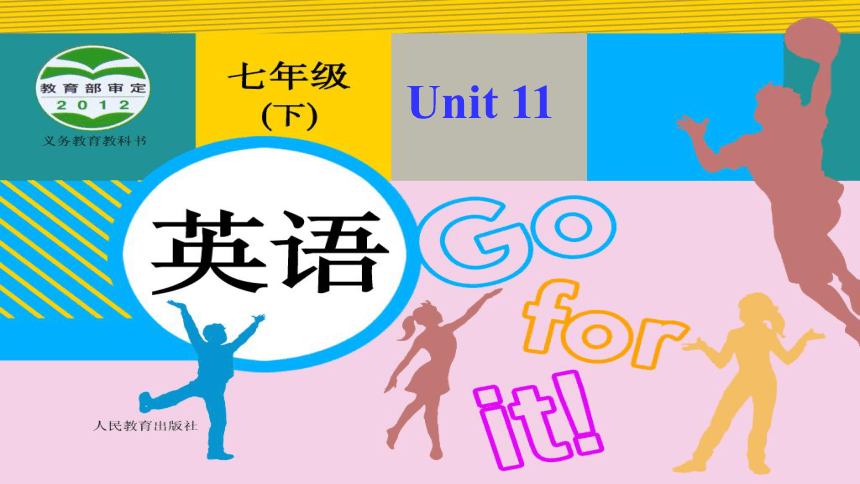
|
|
| 格式 | pptx | ||
| 文件大小 | 7.1MB | ||
| 资源类型 | 教案 | ||
| 版本资源 | 人教新目标(Go for it)版 | ||
| 科目 | 英语 | ||
| 更新时间 | 2021-06-15 00:00:00 | ||
图片预览

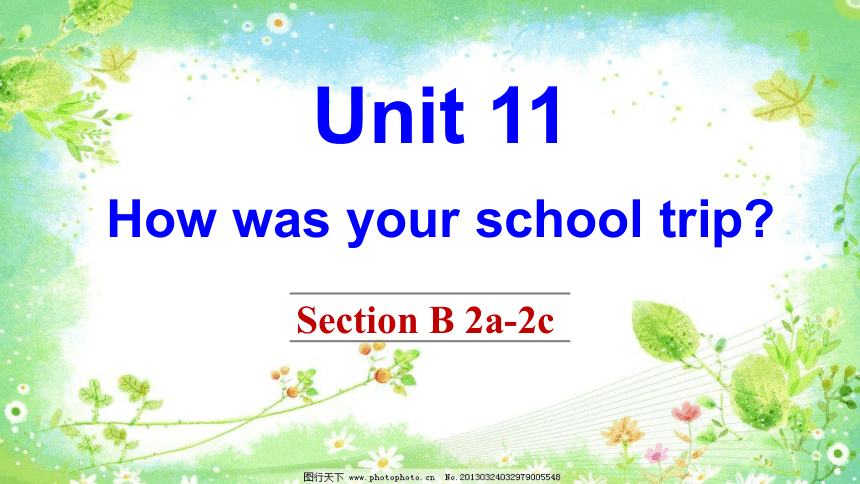
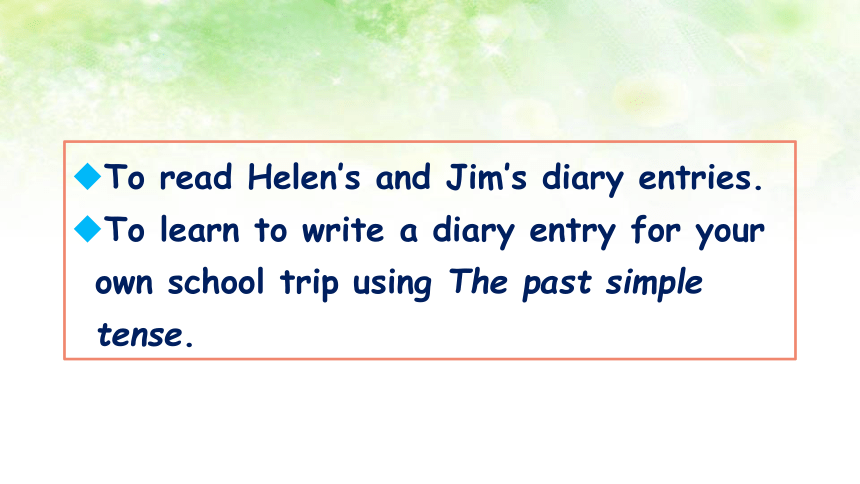
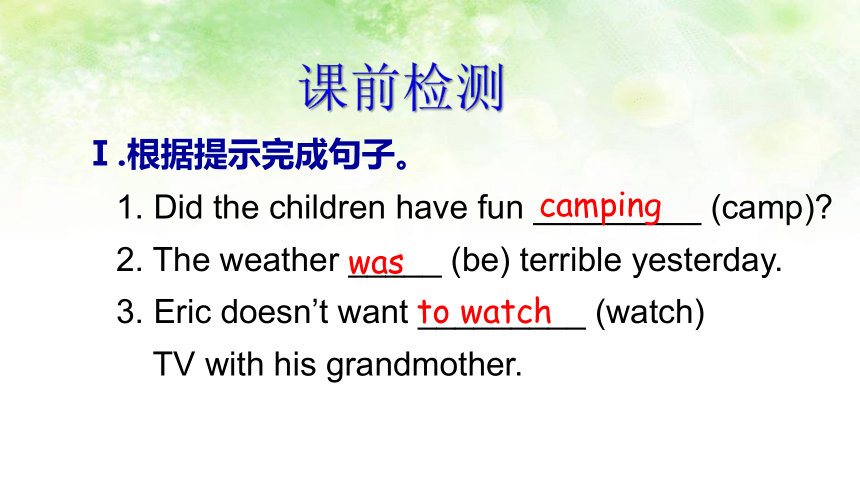
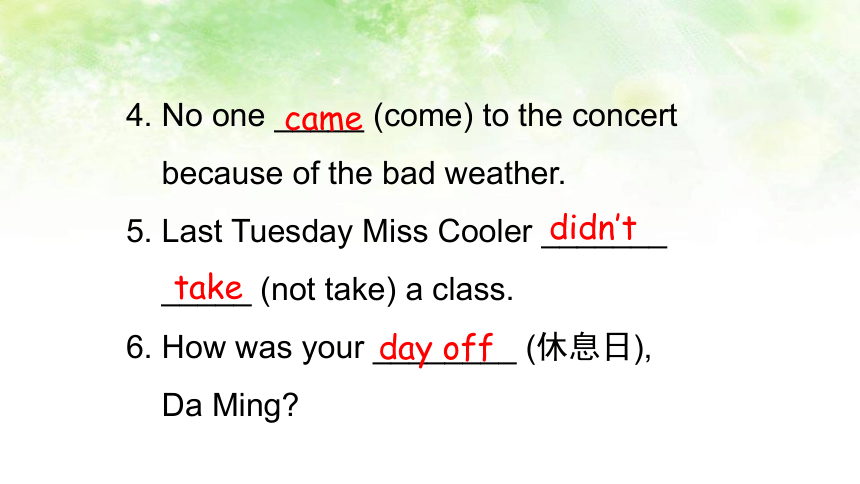
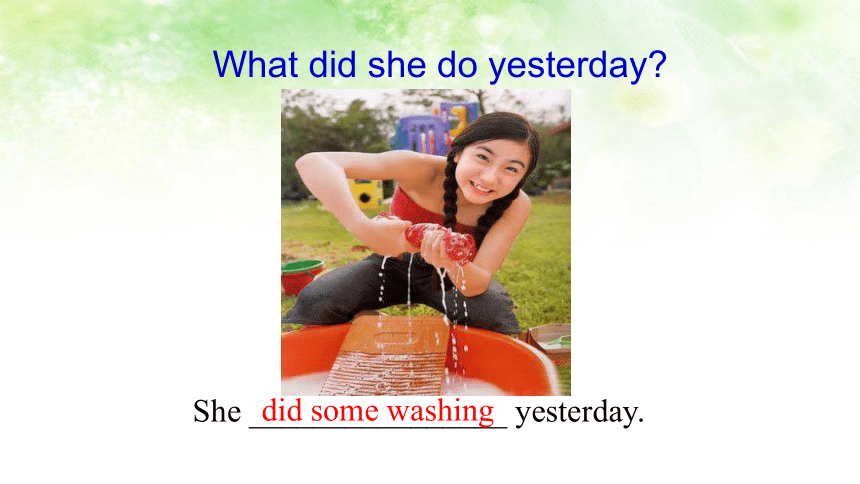
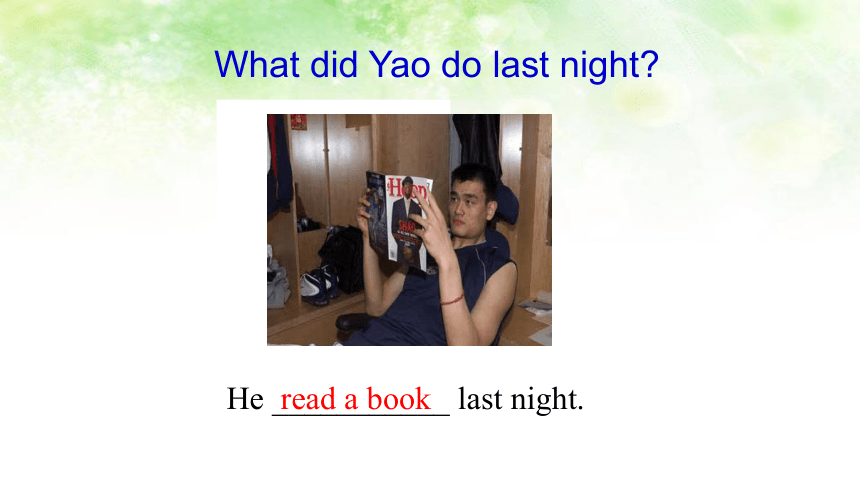
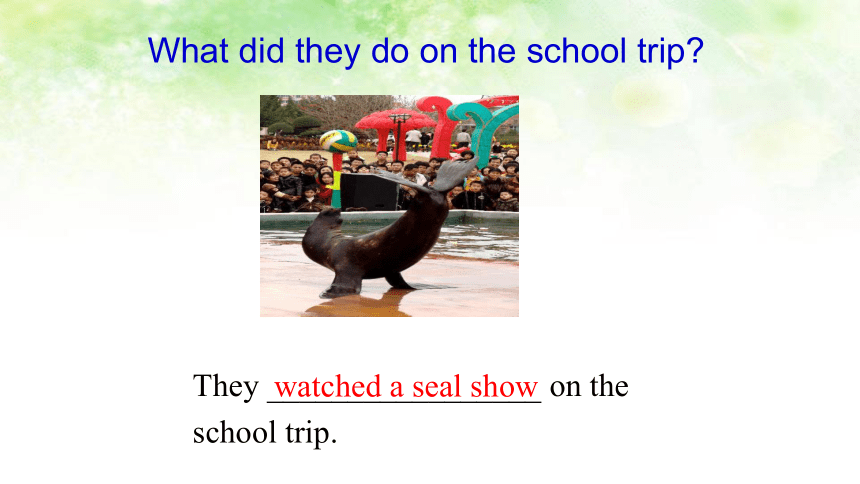
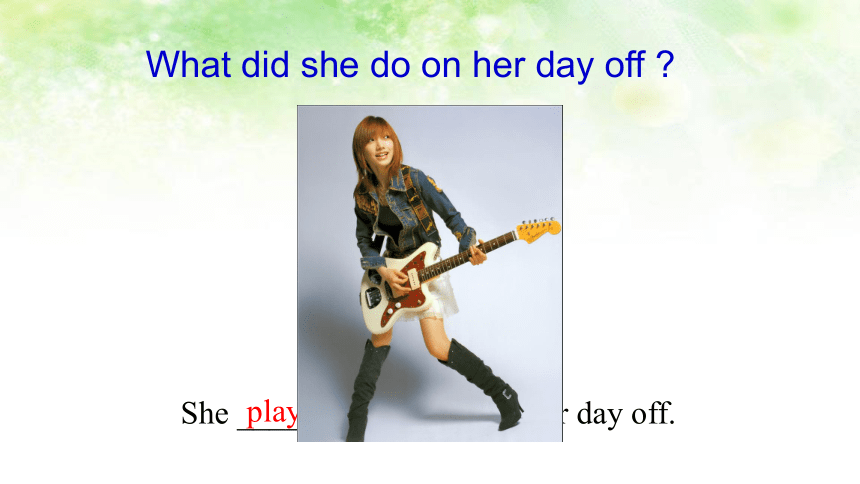
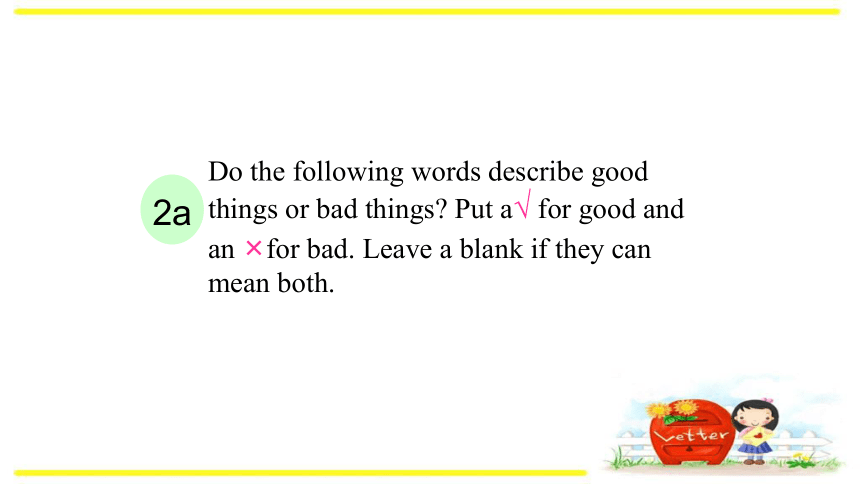

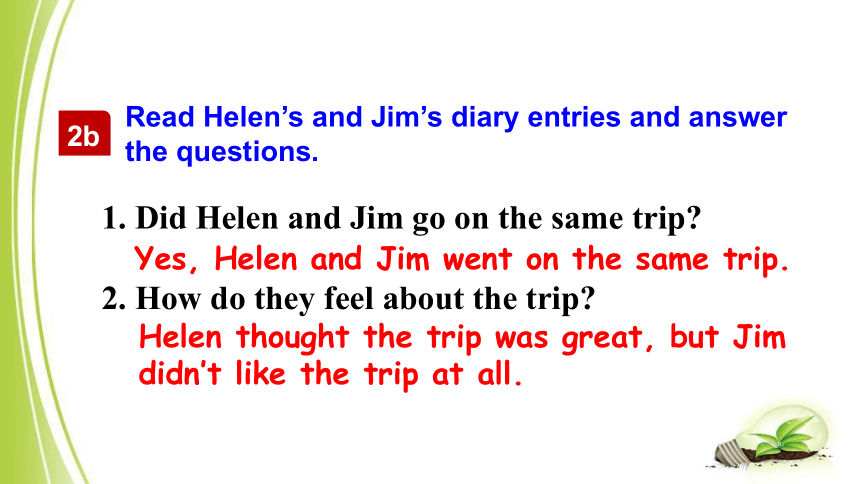
文档简介
Unit 11
Unit 11
How was your school trip?
Section B 2a-2c
To read Helen’s and Jim’s diary entries.
To learn to write a diary entry for your own school trip using The past simple tense.
Ⅰ.根据提示完成句子。
1. Did the children have fun _________ (camp)?
2. The weather _____ (be) terrible yesterday.
3. Eric doesn’t want _________ (watch)
TV with his grandmother.
camping
was
to watch
课前检测
4. No one _____ (come) to the concert
because of the bad weather.
5. Last Tuesday Miss Cooler _______
_____ (not take) a class.
6. How was your ________ (休息日),
Da Ming?
came
didn’t
take
day off
She ________________ yesterday.
did some washing
What did she do yesterday?
He ___________ last night.
read a book
What did Yao do last night?
They _________________ on the school trip.
watched a seal show
What did they do on the school trip?
She _______________ on her day off.
played the guitar
What did she do on her day off ?
2a
Do the following words describe good things or bad things? Put a√ for good and an ×for bad. Leave a blank if they can mean both.
____ interesting ____ difficult ____ lovely ____ slow
____ exciting ____ boring ____ cool ____ hot
____ lucky ____ large ____ expensive ____ terrible
____ delicious ____ great ____ cheap ____ fast
√
√
√
√
√
√
√
√
×
×
×
×
×
Read Helen’s and Jim’s diary entries and answer the questions.
1. Did Helen and Jim go on the same trip?
2. How do they feel about the trip?
2b
Yes, Helen and Jim went on the same trip.
Helen thought the trip was great, but Jim
didn’t like the trip at all.
Reading
Helen
Jim
June 15th
Today I went on a school trip. We visited the science museum and it was really interesting. We got there so fast by train. We saw some farms and villages along the way. At the museum, I learned a lot about robots. I didn’t know they could play chess with us. It was so cool!
go on a trip
去旅行
沿途
n. 导游;向导
v. 指引;带领
Then the guide taught us how to make a model robot. I took a lot of great photos, too. After that, I went to the gift shop and bought some lovely gifts for my parents. They weren’t expensive. All in all, it was an exciting day.
疑问词+动词不定式结构
总的来说;总之;整体上说
adj.令人兴奋的,令人激动的
June 15th
I think today’s school trip was terrible. We took the train to the museum. It was so hot on the slow train. The museum was big and boring. Everything was about robots and I’m not interested in that.
含有宾语从句的主从复合句
The rooms were really dark and it was difficult to take photos, so I didn’t take any. There were also too many people and I couldn’t really see or hear the guide. The things in the gift shop were so expensive. I didn’t like the trip at all.
not...at all
一点也不,根本不
Careful Reading
True or False:
1. Helen went to the science museum on the slow train.
2. There were some farms and mountains along the way
to the museum.
3. The guide taught the students how to make a robot.
4. Jim is not interested in robots.
5. There were too many people so Jim couldn’t take photos.
2c Read the diaries again and
complete the chart. How do Helen
and Jim describe these things?
aa
Helen
Jim
the trip
the train
the museum
the gift shop
and gifts
exciting
lovely, not expensive
really interesting
fast
terrible
slow
big, boring, dark,
too many people
so expensive
Language points
1. Today I went on a school trip.
go on a trip 意为“去旅行”,相当于have a trip。
go on a trip to… 意为“到……去旅行”。
例句:上周我们进行了一次学校旅行。
We went on a school trip last week.
拓展:go on a trip 类似的短语
go on a hike 去远足
go on a visit 去访问
go on vacation 去度假
2. Then the guide taught us how to make a model robot.
疑问词包括:疑问代词:what, which, who, whose
疑问副词:when, where, how, why 等。
这些疑问词和动词不定式一起构成了动词不定式短语。在句子中可作主语、宾语、表语等。
how to make a model robot 为“疑问词+动词不定式”结构。
1. 我不知道下一步做什么。
I don’t know ________________ next.
2. 我不知道怎样拼写这个单词。
I don’t know ________________the word.
what to do
how to spell
填空。
3. Then the guide taught us how to make a model robot.
taught 是动词 teach 的过去式,意为“教”,后面常接双宾语,即:teach sb. sth. = teach sth. to sb.
例句:他教学生英语。
He teaches English to the students.
=He teaches students English.
教某人做某事
teach sb. to do sth. 教某人做某事
teach sb. sth. 教某人某事
teach oneself 自学
4. All in all, it was an exciting day.
all in all 总的来说;总之;整体上说
常用于句首,用来对所阐述的内容进行概括性总结及归纳。
例句:总的来说,你表现不错。
All in all,you do well.
{93296810-A885-4BE3-A3E7-6D5BEEA58F35}
含义
句子位置/适用句型
all in all
in all
at all
all in all, in all 与 at all
总的来说
总共,合计
根本
常用于句首
句首或句末
常用于否定句中
not (…) at all 根本不
______________, she is an excellent teacher.
总的来说,她是一位优秀的老师。
They raised 10,000 yuan _______________. 他们总共筹集了一万元。
He doesn’t know Chinese ________________.
他根本不懂汉语。
牛刀小试
All in all
at all
in all
5. exciting
exciting常用来修饰物,意思为“令人兴奋的,令人激动的”。
例句:那是本令人激动的书。
That is an exciting book.
辨析: exciting 与 excited
exciting
excited
令人兴奋的;
令人激动的
感到兴奋的;
感到激动的
修饰物;
作定语或表语
修饰人;作表语
6. Everything was about robots and I’m not interested in that.
每个东西都是关于机器人的,我对此不感兴趣。
be interested in 对……感兴趣
例如:我们对英语感兴趣。
We are interested in English.
辨析:interested/interesting
interested
人对事物感兴趣
事物本身
有趣
interesting
用于句型be(become)
interested in
可作定语和表语
用interesting / interested 填空。
1. The book is very _________. Most of the teachers are _________in it.
2. The boy has much _________ in drawing.
3. 3岁的时候,他开始对音乐产生了兴趣。
He ______ _________ _______music when he was 3 years old.
interesting
interested
interested
was interested in
我对收集邮票很感兴趣。
I am interested in collecting stamps.
那是一本很有意思的书,你一定要读读。
That is an interesting book,you must read it.
辨析:interested/interesting
7. I think today’s school trip was terrible.
本句为含有宾语从句的主从复合句。主句为一般现在时态,宾语从句根据具体情况选用所需时态。宾语从句要保持陈述语序。
例句:我认为数学很难。
I think math is hard.
4. today’s school trip
表示有生命的东西的名词及某些表示时间、距离、星球、世界、国家等无生命的东西的名词后加 ’s来表示所有关系,叫做名词所有格。
例如: men’s room 男厕所
a mile’s distance 一英里的距离
但如果该名词是以-s或-es接尾,则只在该名词后加“’”来构成所有格。
例如: 3 hours’ walk 三小时的路程
five minutes’ walk 五分钟路程
two miles’ distance 两英里的距离
8. There were also too many people.
too many加可数名词 too many students
too much加不可数名词 too much water
Ⅰ.根据句意及汉语提示完成单词。
1. We learned a lot about history in the _ ___ __(博物馆).
2. Alice is a smart and _______(可爱的) girl.
3. — Why didn’t you buy the iPhone?
— Because it was too __________(昂贵的).
4. He went to the shop and bought some _____(礼物) for his friends.
5. I’m sorry, I didn’t ________(听到) what you said.
museum
lovely
expensive
gifts
hear
Exercises
6. … it was difficult to take photos.
It is + adj. (for sb.) to do sth. (对某人来说)做 …... 怎么样
e.g. 对我来说骑车上学是很容易的。
It is easy for me to go to school by bike.
7. There were also too many people.
8. I didn’t like the trip at all.
我一点也不喜欢这次旅游。
too many加可数名词 too many students
too much加不可数名词 too much water
not… at all “一点也不;根本不”
e.g. 我根本不喜欢吃苹果。
I don’t like apples at all.
Ⅱ.用所给单词的正确形式填空。
1. Yesterday we ________(visit) the art museum.
2. Can you teach me how _________(swim)?
3. I think it’s difficult ___________(learn)
English well.
4. Let’s go ________(fish) this weekend.
5. Helen is ___________(interest) in music.
She wants to be a musician.
visited
to swim
to learn
fishing
interested
Unit 11
How was your school trip?
Section B 2a-2c
To read Helen’s and Jim’s diary entries.
To learn to write a diary entry for your own school trip using The past simple tense.
Ⅰ.根据提示完成句子。
1. Did the children have fun _________ (camp)?
2. The weather _____ (be) terrible yesterday.
3. Eric doesn’t want _________ (watch)
TV with his grandmother.
camping
was
to watch
课前检测
4. No one _____ (come) to the concert
because of the bad weather.
5. Last Tuesday Miss Cooler _______
_____ (not take) a class.
6. How was your ________ (休息日),
Da Ming?
came
didn’t
take
day off
She ________________ yesterday.
did some washing
What did she do yesterday?
He ___________ last night.
read a book
What did Yao do last night?
They _________________ on the school trip.
watched a seal show
What did they do on the school trip?
She _______________ on her day off.
played the guitar
What did she do on her day off ?
2a
Do the following words describe good things or bad things? Put a√ for good and an ×for bad. Leave a blank if they can mean both.
____ interesting ____ difficult ____ lovely ____ slow
____ exciting ____ boring ____ cool ____ hot
____ lucky ____ large ____ expensive ____ terrible
____ delicious ____ great ____ cheap ____ fast
√
√
√
√
√
√
√
√
×
×
×
×
×
Read Helen’s and Jim’s diary entries and answer the questions.
1. Did Helen and Jim go on the same trip?
2. How do they feel about the trip?
2b
Yes, Helen and Jim went on the same trip.
Helen thought the trip was great, but Jim
didn’t like the trip at all.
Reading
Helen
Jim
June 15th
Today I went on a school trip. We visited the science museum and it was really interesting. We got there so fast by train. We saw some farms and villages along the way. At the museum, I learned a lot about robots. I didn’t know they could play chess with us. It was so cool!
go on a trip
去旅行
沿途
n. 导游;向导
v. 指引;带领
Then the guide taught us how to make a model robot. I took a lot of great photos, too. After that, I went to the gift shop and bought some lovely gifts for my parents. They weren’t expensive. All in all, it was an exciting day.
疑问词+动词不定式结构
总的来说;总之;整体上说
adj.令人兴奋的,令人激动的
June 15th
I think today’s school trip was terrible. We took the train to the museum. It was so hot on the slow train. The museum was big and boring. Everything was about robots and I’m not interested in that.
含有宾语从句的主从复合句
The rooms were really dark and it was difficult to take photos, so I didn’t take any. There were also too many people and I couldn’t really see or hear the guide. The things in the gift shop were so expensive. I didn’t like the trip at all.
not...at all
一点也不,根本不
Careful Reading
True or False:
1. Helen went to the science museum on the slow train.
2. There were some farms and mountains along the way
to the museum.
3. The guide taught the students how to make a robot.
4. Jim is not interested in robots.
5. There were too many people so Jim couldn’t take photos.
2c Read the diaries again and
complete the chart. How do Helen
and Jim describe these things?
aa
Helen
Jim
the trip
the train
the museum
the gift shop
and gifts
exciting
lovely, not expensive
really interesting
fast
terrible
slow
big, boring, dark,
too many people
so expensive
Language points
1. Today I went on a school trip.
go on a trip 意为“去旅行”,相当于have a trip。
go on a trip to… 意为“到……去旅行”。
例句:上周我们进行了一次学校旅行。
We went on a school trip last week.
拓展:go on a trip 类似的短语
go on a hike 去远足
go on a visit 去访问
go on vacation 去度假
2. Then the guide taught us how to make a model robot.
疑问词包括:疑问代词:what, which, who, whose
疑问副词:when, where, how, why 等。
这些疑问词和动词不定式一起构成了动词不定式短语。在句子中可作主语、宾语、表语等。
how to make a model robot 为“疑问词+动词不定式”结构。
1. 我不知道下一步做什么。
I don’t know ________________ next.
2. 我不知道怎样拼写这个单词。
I don’t know ________________the word.
what to do
how to spell
填空。
3. Then the guide taught us how to make a model robot.
taught 是动词 teach 的过去式,意为“教”,后面常接双宾语,即:teach sb. sth. = teach sth. to sb.
例句:他教学生英语。
He teaches English to the students.
=He teaches students English.
教某人做某事
teach sb. to do sth. 教某人做某事
teach sb. sth. 教某人某事
teach oneself 自学
4. All in all, it was an exciting day.
all in all 总的来说;总之;整体上说
常用于句首,用来对所阐述的内容进行概括性总结及归纳。
例句:总的来说,你表现不错。
All in all,you do well.
{93296810-A885-4BE3-A3E7-6D5BEEA58F35}
含义
句子位置/适用句型
all in all
in all
at all
all in all, in all 与 at all
总的来说
总共,合计
根本
常用于句首
句首或句末
常用于否定句中
not (…) at all 根本不
______________, she is an excellent teacher.
总的来说,她是一位优秀的老师。
They raised 10,000 yuan _______________. 他们总共筹集了一万元。
He doesn’t know Chinese ________________.
他根本不懂汉语。
牛刀小试
All in all
at all
in all
5. exciting
exciting常用来修饰物,意思为“令人兴奋的,令人激动的”。
例句:那是本令人激动的书。
That is an exciting book.
辨析: exciting 与 excited
exciting
excited
令人兴奋的;
令人激动的
感到兴奋的;
感到激动的
修饰物;
作定语或表语
修饰人;作表语
6. Everything was about robots and I’m not interested in that.
每个东西都是关于机器人的,我对此不感兴趣。
be interested in 对……感兴趣
例如:我们对英语感兴趣。
We are interested in English.
辨析:interested/interesting
interested
人对事物感兴趣
事物本身
有趣
interesting
用于句型be(become)
interested in
可作定语和表语
用interesting / interested 填空。
1. The book is very _________. Most of the teachers are _________in it.
2. The boy has much _________ in drawing.
3. 3岁的时候,他开始对音乐产生了兴趣。
He ______ _________ _______music when he was 3 years old.
interesting
interested
interested
was interested in
我对收集邮票很感兴趣。
I am interested in collecting stamps.
那是一本很有意思的书,你一定要读读。
That is an interesting book,you must read it.
辨析:interested/interesting
7. I think today’s school trip was terrible.
本句为含有宾语从句的主从复合句。主句为一般现在时态,宾语从句根据具体情况选用所需时态。宾语从句要保持陈述语序。
例句:我认为数学很难。
I think math is hard.
4. today’s school trip
表示有生命的东西的名词及某些表示时间、距离、星球、世界、国家等无生命的东西的名词后加 ’s来表示所有关系,叫做名词所有格。
例如: men’s room 男厕所
a mile’s distance 一英里的距离
但如果该名词是以-s或-es接尾,则只在该名词后加“’”来构成所有格。
例如: 3 hours’ walk 三小时的路程
five minutes’ walk 五分钟路程
two miles’ distance 两英里的距离
8. There were also too many people.
too many加可数名词 too many students
too much加不可数名词 too much water
Ⅰ.根据句意及汉语提示完成单词。
1. We learned a lot about history in the _ ___ __(博物馆).
2. Alice is a smart and _______(可爱的) girl.
3. — Why didn’t you buy the iPhone?
— Because it was too __________(昂贵的).
4. He went to the shop and bought some _____(礼物) for his friends.
5. I’m sorry, I didn’t ________(听到) what you said.
museum
lovely
expensive
gifts
hear
Exercises
6. … it was difficult to take photos.
It is + adj. (for sb.) to do sth. (对某人来说)做 …... 怎么样
e.g. 对我来说骑车上学是很容易的。
It is easy for me to go to school by bike.
7. There were also too many people.
8. I didn’t like the trip at all.
我一点也不喜欢这次旅游。
too many加可数名词 too many students
too much加不可数名词 too much water
not… at all “一点也不;根本不”
e.g. 我根本不喜欢吃苹果。
I don’t like apples at all.
Ⅱ.用所给单词的正确形式填空。
1. Yesterday we ________(visit) the art museum.
2. Can you teach me how _________(swim)?
3. I think it’s difficult ___________(learn)
English well.
4. Let’s go ________(fish) this weekend.
5. Helen is ___________(interest) in music.
She wants to be a musician.
visited
to swim
to learn
fishing
interested
同课章节目录
- Unit 1 Can you play the guitar?
- Section A
- Section B
- Unit 2 What time do you go to school?
- Section A
- Section B
- Unit 3 How do you get to school?
- Section A
- Section B
- Unit 4 Don't eat in class.
- Section A
- Section B
- Unit 5 Why do you like pandas?
- Section A
- Section B
- Unit 6 I'm watching TV.
- Section A
- Section B
- Review of Units 1-6
- Unit 7 It's raining!
- Section A
- Section B
- Unit 8 Is there a post office near here?
- Section A
- Section B
- Unit 9 What does he look like?
- Section A
- Section B
- Unit 10 I'd like some noodles.
- Section A
- Section B
- Unit 11 How was your school trip?
- Section A
- Section B
- Unit 12 What did you do last weekend?
- Section A
- Section B
